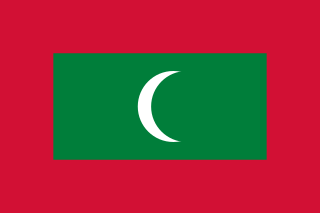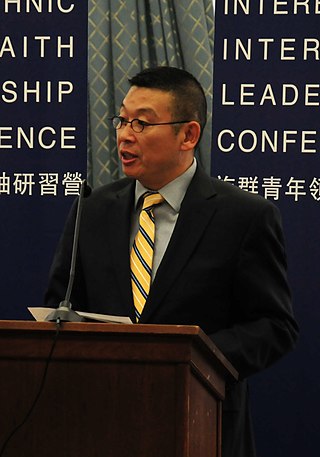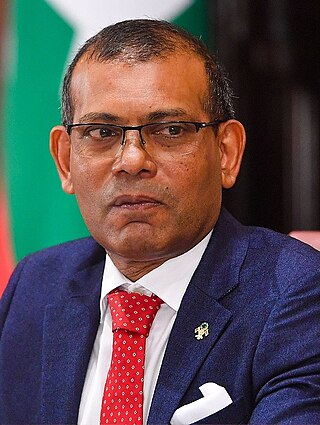| |||||
| Decades: | |||||
|---|---|---|---|---|---|
| See also: | |||||
The following lists events that happened during 2005 in the Republic of the Maldives .
| |||||
| Decades: | |||||
|---|---|---|---|---|---|
| See also: | |||||
The following lists events that happened during 2005 in the Republic of the Maldives .

The Maldives, officially the Republic of Maldives, and historically known as the Maldive Islands, is a country and archipelagic state in South Asia in the Indian Ocean. The Maldives is southwest of Sri Lanka and India, about 750 kilometres from the Asian continent's mainland. The Maldives' chain of 26 atolls stretches across the equator from Ihavandhippolhu Atoll in the north to Addu Atoll in the south.

The history of the Maldives is intertwined with the history of the broader Indian subcontinent and the surrounding regions, comprising the areas of South Asia and Indian Ocean. The modern nation is formed of 26 natural atolls, comprising 1194 islands. Historically, the Maldives has held strategic importance due to its location on the major marine routes of the Indian Ocean. The Maldives's nearest neighbors are the British Indian Ocean Territory, Sri Lanka and India. The United Kingdom, Sri Lanka, and some Indian kingdoms have had cultural and economic ties with the Maldives for centuries. In addition to these countries, Maldivians also traded with Aceh and many other kingdoms in what is today Indonesia and Malaysia. The Maldives provided the primary source of cowrie shells, which were then used as currency throughout Asia and parts of the East African coast. Most probably, Maldives were influenced by Kalingas of ancient India who were earliest sea traders to Sri Lanka and the Maldives from India, responsible for the spread of Buddhism. Stashes of Chinese crockery found buried in various locations in the Maldives also show that there was direct or indirect trade contact between China and the Maldives. In 1411 and 1430, the Chinese admiral Zheng He (鄭和) visited the Maldives. The Chinese also became the first country to establish a diplomatic office in the Maldives when the Chinese nationalist government based in Taipei opened an embassy in Malé in 1966. The Embassy of the People's Republic of China has since replaced this office.

The Maldives has remained an independent nation throughout its recorded history, save for a brief spell of Portuguese occupation in the mid-16th century. From 1900 to 1965, the country was a British protectorate while retaining full internal sovereignty. At its independence in 1965, the Maldives joined the United Nations on 20 September.

Maumoon Abdul Gayoom is a Maldivian statesman, diplomat and scholar who served as the 3rd president of the Maldives from 1978 to 2008. He previously served as the Minister of Transport from 1977 to 1978, and as the Permanent Representative of the Maldives to the United Nations from 1976 to 1977. After serving six presidential terms, Gayoom became the longest serving president in Asia.

Wang Dan is a leader of the Chinese democracy movement and was one of the most visible student leaders in the Tiananmen Square protests of 1989. He holds a PhD in history from Harvard University, and from August 2009 to February 2010, Wang taught cross-strait history at Taiwan's National Chengchi University as a visiting scholar. He then taught at National Tsing Hua University until 2015.

Yang Jianli is a Chinese dissident with a United States residency. He is the son of a Communist Party leader. Yang was detained in China in 2002 and was released in 2007. He now lives in the United States, where he is a human rights activist.

The Maldivian Democratic Party is the first political party formed in the Republic of Maldives with a total membership of 50,980 individuals as of July 28, 2024.

Natan Sharansky is an Israeli politician, human rights activist, and author. He served as Chairman of the Executive for the Jewish Agency from June 2009 to August 2018, and currently serves as Chairman for the Institute for the Study of Global Antisemitism and Policy (ISGAP), an American non-partisan organization. A former Soviet dissident, he spent nine years imprisoned as a refusenik during the 1970s and 1980s.
Nguyễn Đan Quế is a Vietnamese endocrinologist and pro-democracy activist in Saigon. He was imprisoned from 1978 to 1988, 1990 to 1998, 2003 to 2005, and briefly in 2011 on state security charges related to his activism. In 2003, The New York Times described him as "Vietnam's most renowned dissident".

The Cuban dissident movement is a political movement in Cuba whose aim is to replace the current government with a liberal democracy. According to Human Rights Watch, the Marxist-Leninist Cuban government represses nearly all forms of political dissent.

Ayman Abd El Aziz Nour is an Egyptian politician, a former member of the Egyptian Parliament, founder and chairman of the El Ghad party.

Mohamed Nasheed GCSK, also known as Anni, is a Maldivian politician and activist who served as president of the Maldives from 2008 until his resignation in 2012. A founding member of the Maldivian Democratic Party, he subsequently served as the 19th speaker of the People's Majlis from May 2019 until his resignation in November 2023. He is the first democratically elected president of the Maldives and the only president to resign from office. He is currently a member of The Democrats.

Ahmed Shaheed is a Maldivian diplomat, politician and professor. On 24 March 2016, he was appointed for the sixth year running as the United Nations Special Rapporteur on the human rights situation in the Islamic Republic of Iran. Shaheed is also the Chairperson of the Geneva-based international human rights think-tank, Universal Rights Group, which was launched in January 2014. He now lives in England as a Professor of Human Rights Practice at the University of Essex. Shaheed is also a Senior Fellow at Raoul Wallenberg Human Rights Centre and a Fellow at the Bonavero Institute of Human rights at the University of Oxford.
Sandhaanu was an online political news magazine in the Maldives. It was launched in 1999.
Parliamentary elections were held in the Maldives on 9 May 2009.

Chen Ziming and Wang Juntao were arrested in late 1989 for their involvement in the 1989 Tiananmen Square protests and massacre. Chinese authorities alleged they were the "black hands" behind the movement. Both Chen and Wang rejected the allegations made against them. They were put on trial in 1990 and sentenced to 13 years in prison.
The 2011–2013 Maldives political crisis began as a series of peaceful protests that broke out in the Maldives on 1 May 2011. They would continue, eventually escalating into the resignation of President Mohamed Nasheed in disputed circumstances in February 2012. Demonstrators were protesting what they considered the government's mismanagement of the economy and were calling for the ouster of President Nasheed. The main political opposition party in the country, the Dhivehi Rayyithunge Party led by the former president of the country Maumoon Abdul Gayoom accused President Nasheed of "talking about democracy but not putting it into practice." The protests occurred during the Arab Spring.

Husnu Al Suood born in Meedhoo is a Justice of the Supreme Court of the Republic of Maldives since 8 December 2019. He was the Attorney General of the Maldives from June 2009 to August 2010. He served as the Chief Judge of the Civil Court and as a member of the Judicial Service Commission of Maldives. He also served as a member of the National Human Rights Commission of the Maldives from 2003 to 2005. As a member of the Special Majlis, Suood participated in drafting the current constitution of the Republic of Maldives.
The Geneva Summit for Human Rights and Democracy is an annual human rights summit sponsored by a coalition of 20 non-governmental organizations. Each year, on the eve of the United Nations Human Rights Council's main annual session, activists from around the world meet to raise international awareness of human rights situations.

Ibrahim Mohamed Solih, commonly known as Ibu, is a Maldivian politician who served as president of the Maldives from 2018 to 2023.